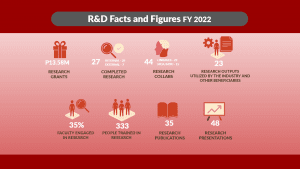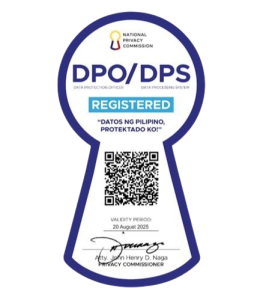Research
Research Mandates as The National Engineering University
As mandated by Republic Act 11694, the Batangas State University as the National Engineering University shall:
- Serve as a research university in engineering and other related fields of specialization by conducting basic and applied research and development, promoting research collaboration with various colleges and universities in the country, and contributi ng to the dissemination and application of knowledge;
- Create, develop and implement a functional research program that is relevant to the research agenda of the University and supporting research programs for sustainable development;
- Intensify scientific, innovative, and technological research and development that would lead to the development of highimpact research, startups, and spinoffs, and technology transfer of products and services in specific areas such as electronic systems, environm ent, information and computing technology, material science and testing, and advanced manufacturing through the established research centers under the Science, Technology, Engineering and Environment Research (STEER) Hub, recognized by the Regional Develop ment Council (RDC) as the Center for Science, Technology, Engineering and Environment Research in the CALABARZON Region; and
- Lead in the protection, conservation, and strategic management of the Verde Island Passage (VIP) that separated the islands of Lu zon and Mindoro, and described as the "center of the center of marine shore fish biodiversity in the world" by developing biodiversity experts, conducting collaborative research, marine exploration, community education, and training, and establishment of t he Verde Island Passage (VIP) for Oceanographic Research and Aquatic Life Sciences (VIP CORALS) by the Regional Development CouncilRegion IVA (Cavite, Laguna, Batangas, Rizal and Quezon Region) as the National Center for marine Biodiversity in VIP.
Objectives
As a National Engineering University, BatStateU is mandated by Republic Act 11694 to serve as a research university in engineering and related fields, create and implement relevant research programs for sustainable development, intensify scientific, innovative, and technological research and development, and lead in the protection and strategic management of the Verde Island Passage through the establishment of the VIP CORALS as the National Center for marine Biodiversity in VIP.
To foster R&D and Innovation in the University, the BatStateU-The NEU’s Research Framework focuses on following objectives:
- Foster research- and innovation-conducive environment. Provide faculty and students with assistance and support in creating an environment that is conducive for innovation, which will eventually create avenues for high impact research, technology transfer and commercialization of their research.
- Disseminate research-based solutions. Ensure effective dissemination and application of research output through oral and/or poster presentations and publication of results in refereed journals, and when appropriate, research output commercialization to foster innovative and creative research thinking among faculty, students and stakeholders.
- Immerse BatStateU-The NEU community in research culture. Develop a culture of research among faculty, students and stakeholders by involving them in research activities through multidisciplinary and collaborative research, seminar workshops, training, research fora, research assistantships and other research interactions and engagement.
- Strengthen collaborative research networks. Strengthen research consortia, linkages, collaborative research, mentorship and research skills development can augment research funding of the University.
- Optimize research outputs for tech transfer and business incubation. Optimize the utilization of research outputs for technology transfer and possible income generating projects related to research and development and strengthen product development and technology business incubation.
- Strengthen industry-related research for addressing gaps. Strengthen industry-related research projects to address the gaps and challenges faced by its stakeholders.
- Transforming the national economy through KIST Park. Contribute to national economic growth, jobs creation, domestic and foreign investment, and community wellbeing through the university-based Knowledge, Innovation and Science Technology (KIST) Park, it also aims to promote industrial R&D, attract foreign investments in higher valuelaboradded activities, and accelerate the country’s transition from a intensive economy to a knowledge-intensive one designated as a Special Economic Zone by virtue of Presidential Proclamation No. 947, dated May 22, 2020.
- Increase quality research and productivity for impactful utilization. Deliver quality, high-impact research and increase productivity of the university in terms of capacitating its people, and producing publications and Intellectual Property (IP) assets. Generate high impact research outputs for the utilization of the educational, communal, and industrial sectors.
- Promote industry-academe collaboration. Leads in the pioneering initiatives of establishing a technopreneurship program and a university based Special Economic Zone (SEZ) that aims to promote industry collaboration through active research and innovation.
- Creating research focused on specific thematic areas. Develop quality research projects on the following key areas such as Industry, Energy and Emerging Technology Research (IEETR), Agriculture, Aquatic and Natural Resources (AANR), Integrated Basic and Applied Research (IBAR), and Disaster Risk Management and Health Research (DRMHR).
- Enhancing research capabilities. Enhance the research capabilities of the faculty and student researchers through human and physical resources development and the creation of an environment that fosters research.
Research Agenda
Hewing closely to the Harmonized National Research & Development Agenda, the BatStateU Research Agenda focuses on the following areas and interstices:
- Industry, Energy and Emerging Technology Research (IEETR);
- Agriculture, Aquatic and Natural Resources (AANR);
- Integrated Basic and Applied Resear ch (IBAR); and
- Disaster Risk Management and Health Research (DRMHR).
Strategies of Implementation
The University adopted a range of strategies to implement its Research Agenda, leveraging its expertise, partnerships, and resources to promote innovation, knowledge transfer, and community engagement.
- Networking and Collaboration. Develop a networking system among the colleges that will facilitate planning, packaging of research proposals, implementation and monitoring, evaluation, documentation, dissemination, utilization and commercialization of research outputs.
- Investment on Human Capital. Provide a continuing program of upgrading the human capabilities in research traini ng programs, giving incentives to researchers, developing a pool of research experts, practicing the mentor system and others.Be active in supporting institutionally and externally funded research of faculty members and students in the undergraduate and graduate programs.
- Resource and Fund Generation. Source out funds from external sources for upgrading physical facilities and equipment and implementation of other research undertakings.
- High Impact and Relevant Research Programs. Undertake quality research in line with the University Research Agenda which can be utilized by the community and industries. Intensify scientific, innovative and technological research and development leading to high impact research. Spearhead innovative programs and p olicies to support its faculty, personnel, and students.
- Linkages and Cooperation. Establish and maintain linkages with local and foreign research organizations, universities, non-government organizations and other private or government agencies.
- Establishment of Niche Research Centers. Establish niche research centers focusing on collaborative and innovative research programs/projects and addressing the immediate need of community and industries.
- Incorporation of Sustainable Development Goals (SDGs) in Research Undertakings. Incorporate the sustainable development goals in the conduct of research programs, projects, and activities.
Embracing the Research Culture
Promoting a research culture that can viably impact the future requires a multi-pronged approach that involves a variety of stakeholders, including administrators, faculty, students, and external organizations. Here at BatStateU-The NEU, sound strategies are implemented to help promote a research culture:
- Encouraging Faculty Involvement: Faculty members play a critical role in promoting a research culture. Encouraging them to engage in research activities and publish their findings can help create a research-oriented environment. The University and its partner agencies provide financial and logistical support for faculty members to conduct research, attend conferences, and collaborate with other researchers. See our Faculty Experts
- Supporting Student Research: Encouraging and supporting student research can help create a research culture at the university. BatStateU-The NEU provides students research opportunities and the necessary resources, such as funding, lab space, and equipment. The University also incentivizes students to pursue research through academic credit or scholarships to help create a research-oriented environment.
- Building Partnerships with Industry: Building partnerships with industry can provide students and faculty members with practical research experiences and help bring cutting-edge research projects to the university. Industry partners can also provide financial support and collaborate on research projects.
- Developing Research Infrastructure: Adequate research infrastructure, such as well-equipped labs, libraries, and computing resources, is crucial for promoting a research culture. The University invests in modern research facilities and equipment and make them accessible to students, faculty members, and other stakeholders. Check out our Research Centers
- Fostering Collaboration: Collaboration between researchers, both within and outside the university, can help create a research-oriented environment. The University encourages interdisciplinary collaboration and provides opportunities for researchers to present their work at conferences and workshops to help foster a collaborative research culture.
- Recognizing and Rewarding Research Contributions: Recognizing and rewarding research contributions can help create a culture that values research. The University recognizes the importance of awarding outstanding research contributions and achievements of their researchers.
R&D Facts and Figures
BatStateU-The NEU continues to drive progress in the broad field of research and development. Here are the R&D milestones for the recent year:

- 27 Research Projects Completed. The university produced cutting-edge and high-impact research projects, 20 of which are institutionally funded while 7 are funded by external agencies.
- 23 Research Outputs Utilized. In the last 3 years, the university has produced 23 research outputs that have been utilitized by the industry and other beneficiaries.
- 13 Research Grants worth P13.58M received. The ability of the university to secure funding demonstrates its ability to assure its external partners the production of viable quality research projects that are beneficial and have high-impact to the advancement of knowledge and research in the university.
- 35% of Faculty Members engaged in Research. a total of 205 faculty members were engaged in research in 2022, demonstrating BatStateU-The NEU’s commitment to immerse the academic community in research initiatives.
- 333 People Trained in Research. BatStateU-The NEU continues to increase its productivity in research is by providing a wide-range of trainings and workshops to the research community, such as agency in-house reviews, bootcamps, writeshops, and engagement of researchers in various research programs.
- 48 Research Presentations. Part of the university’s promotion of research excellence is through the presentation of research in regional, national and international conferences, increasing the opportunities for knowledge sharing and research collaboration.
- 35 Research Publications. BatStateU-The NEU’s presence in the sphere of research remains relevant through its research publications in various renowned scientific journals, providing its research community with increased visibility and opportunities for funding and advancement in terms of career and skills development.
- 44 Research Collaborations. Through forged linkages and signing of Memorandum of Agreement (MOA) and Memorandum of Understanding with partner institutions and agencies, the university actively actively seeks out to expand its research network with various local and international entities that share the same vision and interest in advancing research and innovation.



